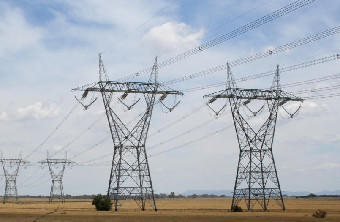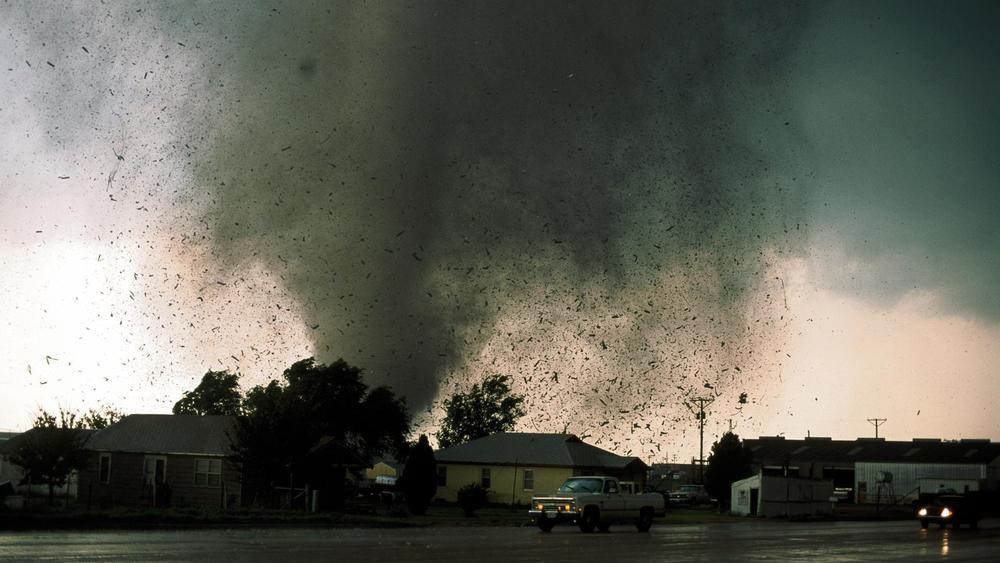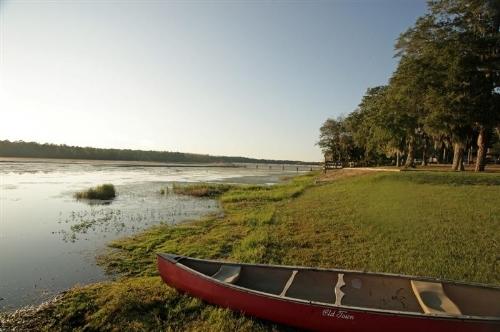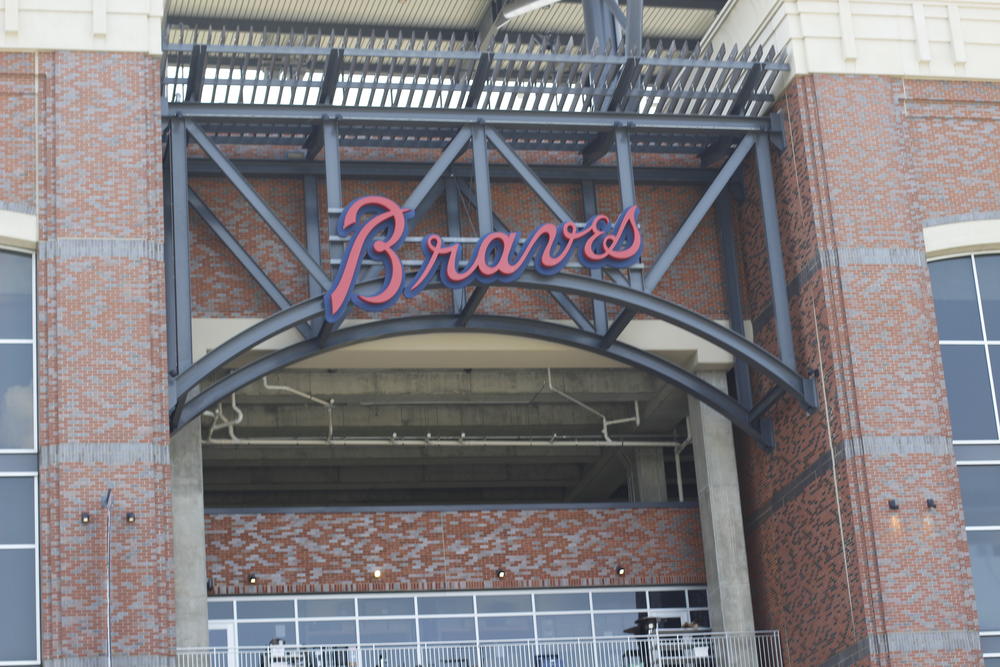
Section Branding
Header Content
Georgia Today: ICE targets Atlanta landlords; Funding cuts for weather; Ocmulgee River short stories
Primary Content
On the Tuesday, July 15 edition of Georgia Today: ICE targets Atlanta landlords for help with immigration arrests; officials warn federal funding cuts could pose weather-related risks to Georgia; and the Ocmulgee River is the inspiration behind a Georgia author's new book of short stories.

Orlando Montoya: Hello and welcome to the Georgia Today podcast. Here we bring you the latest reports from the GPB Newsroom. On today's episode, ICE targets Atlanta landlords for help with immigration arrests. Officials warn federal funding cuts could pose weather-related risks to Georgia, and the Ocmulgee River is the inspiration behind an Atlanta author's new book of stories.
Gordon Johnston: When I'm on the river, I'm completely disconnected. I don't have to keep up with my email and text messages. There's a kind of deliberation about time on the river that's really nice.
Orlando Montoya: Today is Tuesday, July 15. I'm Orlando Montoya, and this is Georgia Today.
Story 1:
Orlando Montoya: Atlanta-area landlords are receiving subpoenas from immigration authorities demanding they turn over tenant information, including leases and IDs. The requests are a sign the Trump administration is targeting landlords to assist in its drive for mass deportations. The subpoena are not signed by judges and raise legal concerns about compliance and potential violations of the Fair Housing Act. An Atlanta-area attorney whose clients received the subpoenas, Eric Teusink, says his clients were confused by them.
Eric Teusink: To me, it seemed like they were on a bit of a fishing expedition and that, you know, if they could get information for tracking down folks they were seeking, I assume for deportation purposes, but I don't know.
Orlando Montoya: Some legal experts advise ignoring such requests unless court-ordered. Teusink says some housing providers might feel forced to comply, risking tenant privacy. Officials with the Department of Homeland Security defend the subpoenas, warning of penalties for non-compliance.

Story 2:
Orlando Montoya: State utility regulators have approved Georgia Power's plan to dramatically increase its electric generating capacity. The Public Service Commission today passed the company's integrated resources plan. It's prompted in large part by the growth of power-hungry data centers across the state. Critics have blasted the plan as relying too much on fossil fuels and not enough on renewable power. The company says the plan will allow it to meet energy needs quote, "reliably and economically." Meanwhile, today, two candidates are facing off in a statewide Democratic runoff election for a seat on the five-member, currently all-Republican commission. Clean energy advocate Peter Hubbard and former state Rep. Keisha Waites are on the ballot. Polls are open until 7 p.m.
Story 3:
Orlando Montoya: Atlanta is a little closer to its goal of building or preserving 20,000 affordable housing units by 2030. GPB's Amanda Andrews reports on a groundbreaking in Southwest Atlanta today.
Amanda Andrews: Sylvan Hills 2 will include over 200 fully affordable housing units in various styles from townhomes to apartments. The project was created without using federal low-income housing tax credits. Councilmember Antonio Lewis represents the area. He says the funding came from eight different public and private organizations.
Antonio Lewis: So that means that the city of Atlanta, that means that Invest Atlanta, Atlanta Housing, HUD, and different private developers had to put money together to make this happen. The only way we were able to keep the affordable component was if we did it in this manner.
Amanda Andrews: The complex is scheduled to open in fall 2026. For GPB News, I'm Amanda Andrews.

Story 4:
Orlando Montoya: A progressive advocacy group says federal funding cuts pose weather-related risks to Georgia. Officials with Progress Georgia made the remarks during a press conference today. Speaking at the press conference, former National Oceanic and Atmospheric Administration official Monica Medina warned against reducing staff, including at the agency's weather office south of Atlanta.
Monica Medina: All those weather forecasters with all that expertise are going to be stretched even thinner. What does that mean? Key forecasts will be degraded. There will be holes in our weather safety net, not just in Georgia, but all over the country.
Orlando Montoya: The group also raised concerns about climate change and its role in flooding in cities like Atlanta and Savannah, as well as its impact on Georgia's agricultural economy.
Story 5:
Orlando Montoya: Gov. Brian Kemp is ordering state agencies to freeze spending at current levels during this fiscal year and fiscal year 2027. The move is aimed at protecting the state from federal funding cuts in President Trump's big budget bill that Congress passed this month. The state ended fiscal year 2025 with a healthy budget surplus, but the impact of the federal funding cuts remains uncertain. As a result, a letter sent from the Governor's Office of Planning and Budget to agency heads directs them to develop plans for dealing with the loss of federal funding. Some Democratic state lawmakers are calling for a special session to address the funding gaps. Kemp so far has shown no inclination toward reconvening the General Assembly before its regular session beginning in January.
Story 6:
Orlando Montoya: West Nile virus has been detected in mosquitoes sampled from Savannah and just north and south of Atlanta. The public health departments in Fulton and Chatham counties reported the detections this week. There's no cure or vaccine to treat West Nile, which can cause fever, rash, and other symptoms. Health officials advise people to avoid mosquito bites by dressing to avoid skin exposure, draining standing water, and wearing insect repellent with DEET, among other suggestions.

Story 7:
Orlando Montoya: Delta Air Lines has agreed to pay about $8 million to settle claims that it violated terms of a COVID relief program. The U.S. Department of Justice said today the settlement stems from the Atlanta-based airline's participation in a pandemic-era payroll support fund. Delta was accused of paying corporate officers and employees earning more than $425,000 a year over allowed amounts for three years beginning in March 2020. The company denies the allegations.

Story 8:
Orlando Montoya: One of Georgia's great waterways, the Ocmulgee River, flows from Lake Jackson to the Altamaha River, through a wide swath of Middle Georgia. It has inspired stories for as long as people have been living near it — and that's a long, long time. A new book of short stories, inspired by Ocmulgee experiences, earned its author a nomination for the 2025 Townsend Prize, one of Georgia most prestigious literary awards. He is Mercer University English professor Gordon Johnston. He spoke with me about his book, Seven Islands of the Ocmulgee. He's a Warner Robbins native and an avid kayaker and canoeist.
Gordon Johnston: The first time I paddled the river, I was just out to see the place. I was out to see the river's motion, the landscape that it flowed through, all that sort of thing. But I've really paddled the whole thing twice, almost three times now. The second time I paddled a river, when I was moving through these areas I'd seen before, that's when the stories really started to come to me. Except for that first story in the book and the beginning of the last story, all the other ones sort of came to me as I was passing through particular areas of the river.
Orlando Montoya: Now if any of these tories are set in the present day, it's hard to tell because there's no cellphones, computers or other modern conveniences that I can recall. I think in one story, a park ranger uses a walkie talkie, but was this intentional?
Gordon Johnston: I didn't set out not to include any tech in the book. I think partly that development in the book comes from the fact that when I'm on the river, one of the great pleasures of it is I'm completely disconnected. I don't have to keep up with my email and text messages. There's a kind of deliberation about time on the river that's really nice. Many of the stories I felt were coming from a previous time on the river, not out of a contemporary moment. One thing about the Ocmulgee that draws me as much as ever is the sense of a really long human history that's existed and persisted and thrived along that ancient flow. It's a very old river, and as it flows through Macon, it's flowing through a place that's been continuously occupied by people for 12,000 years. And that really old history of the river, I think it made me think sort of expansively about what "contemporary" means.
Orlando Montoya: Now, there are seven stories in the book. Each of them is distinct, but they refer to the others in slight ways. For instance, the main character in one story might be a cousin or a co-worker of a character in another story. You didn't have to do that. Why was it important for the stories to be woven together, even if slightly?
Gordon Johnston: Y'know, that's a good question. Thank you for taking note of that, too. I think one of the reasons I wanted the stories to have a sense of connection is because the river is a great connector. The reason human beings lived here, have lived here for so long, is because of the Ocmulgee is a thoroughfare, you know, it gets you from one place to another. That kind of connectedness, I wanted to stories to kind of suggest that. That also sort of developed, rather than my planning that, I found as I was writing, these relationships just kind of trickled out into the stories. And that happened a couple of times, and then I wanted to sort of follow up on that and enhance it. One thing about short stories, most of the time in a short story, you can't cover the span of a life. You cover a chapter, an episode out of a life. And in this, including these character connections across stories, there are a few arcs of longer development for at least a few of the characters. I guess most of those happen to be minor.
Orlando Montoya: I also notice that the characters seem to talk in shorthand as if they know each other, even if they're strangers. It also seems like telepathy. The dialog is very direct, no one idles in small talk, and I can't decide if that's a product of A) necessity — you know, these are short stories — B) class: these people are mostly working-class characters; or C) your writing style. So, can you talk about your approach to dialogue here?
Gordon Johnston: Oh, well, I think largely that is a development of my writing style. I was a journalist before I was college professor, and I worked for a newspaper that had a 25-word limit on the lead. So I have always tried to write, you know, fairly sharply. I think with the dialogue, though, there's also — You know, on the river, the exchanges you have on the river are often, I mean, they're not what you'd call loquacious. You know, you're paddling, you're on the current, here's a guy anchored in his boat and he's casting for bass up to the bank, right? And you might say, "You getting any?" And his answer is, "Few." And maybe there are a couple of other words scattered in there, but conversation — and it's not that people are terse either, it's more a sense of relaxation behind that shortness. Some of it might be that. And some of these characters, too, they're kind of tough, they're a little hard-bitten.
Orlando Montoya: Many of the characters in the stories are changed by the river. They have some kind of transformation. Why was that an important theme in the book?
Gordon Johnston: You know, as I think about the book, as I was putting it together, I had a much longer book, initially. And then it became these seven stories. And the title of the book, Seven Islands of the Ocmulgee, I realized that these seven stores belonged in a single volume together, because each of the stories involves a person who is something of an island in themselves. They're cut off from meaningful relationships with other people. They might have meaningful relationships, but there are defining relationships for them that have — that are either riddled with tension or they've fallen apart or they've never quite existed in the first place. So I think that the — the sense of transformation: it wasn't so much that I was working for transformation in the stories. But all of the stories they tended towards these characters being brought out of that isolation they were in by something that happens to them on the river.
Orlando Montoya: Did you see the river as a character in this book, and if so, what personality would you say the river has had over its many iterations?
Gordon Johnston: My first instinct is to say yes, the river is a character in the book. It's a force in the book. It makes things happen in the books. It's a condition. And all of these characters, to some extent, are sort of pushing back against the river in some way. I don't know what word I would use to describe the Ocmulgee's character. I will say that all rivers — this is one of the things I love about paddling, whether it's a kayak or a canoe — when you get on the river, you can't stop. You know, you are subjecting yourself, you're subjugating yourself to this greater will. And it's the will of the weather system from a week ago when all the rain came down and raised the level of the river. Or ... it's the influx from maybe a sewage spill in Macon that's come down a tributary and gotten into the river. When you when you get on the river , you have to cooperate with this big, colossal thing that is much larger than you. But every move you make on the river, you've got to negotiate it with the current, with the rocks, with the downed trees that might be in the river and that sort of thing. So it's an incredibly dynamic place.
Orlando Montoya: Gordon Johnston, author of Seven Islands of the Ocmulgee. Thank you for joining me today.
Gordon Johnston: Yes, thank you for having me.
Orlando Montoya: That book is the subject of GPB's first-ever video episode of our podcast, Narrative Edge, co-hosted by me and GPB's Peter Biello. Narrative Edge is all about books with Georgia topics or by Georgia authors. And now you can watch it on YouTube. Listen to Narrative Edge on your favorite podcast app and now watch it YouTube.

Story 9:
Orlando Montoya: The Major League Baseball All-Star Game is scheduled for this evening at Truist Park. The National League, including some Braves players, will take on the All-Stars of the American League. GPB's Peter Biello is there. Peter, thanks for taking some time to talk about this and what's going on. Hey, where are you exactly?
Peter Biello: I'm on the field right now; media is given access to the field for a little bit before the game, but we're going to have to clear off soon so the players can warm up.
Orlando Montoya: So what's new about this All-Star game?
Peter Biello: Well, this game will be the first where the automated balls and strikes system will be used. That's essentially using some kind of radar to kind of allow the pitcher, catcher or batter to challenge a ball or strike call. This has been used in spring training and in the minor leagues, but never for the All-Star Games before. So if a batter, for example, wants to challenge a called strike three, they can tap their helmet a couple of times and challenge the call. And if the call was indeed correct, they lose a challenge. But if they are correct and the umpire was wrong, then they get to keep the challenge. So that's an interesting thing about this All-Star Game. Another thing about this All-Star Game is that it's going back to a tradition that ended just a few years ago in 2019: the players used to use the jerseys that they regularly used. For a few years, they've been using American League and National League jerseys. Those weren't super well-received, so they're going back to the old-fashioned way of wearing their home uniforms. So for example, the Braves players participating will be wearing Braves uniforms.
Orlando Montoya: And what Braves are participating?
Peter Biello: You're gonna see Ronald Acuña Jr.; he's in the starting lineup for the National League. Matt Olson made the team. He's not a starter but he might be swapped out. Freddie Freeman, a former Brave is on the All-Star team so fans will see him here. Also Chris Sale has been named to the team but because of an injury he will not be pitching tonight.
Orlando Montoya: Now you were at the red carpet walk earlier. What is that?
Peter Biello: So the red carpet is a kind of fun All-Star event where players basically get dressed up in high fashion outfits and stroll down the red carpet, which in this case was in The Battery outside Truist Park in Atlanta. And it was a fun thing to see. I am not much of a fashionista, so I don't know on sight exactly what designers players were wearing. But it was cool to see everybody walk down, just dressed really nicely, and clearly enjoying the moment.
Orlando Montoya: Are officials expecting a big economic boost to the area?
Peter Biello: I think they are. They have not released any kind of number that they're hoping to hit in any kind of metric, but what I have heard is that they are waiting for it all to be done so that they can just basically count the stacks and see how they did.
Orlando Montoya: And what about predictions for the game?
Peter Biello: Well I think the first inning is going to be the most interesting because you've Tarek Schubel starting for the American League and Paul Skeen starting for the National League. Both are incredible pitchers but they're gonna be up against, you know, the best hitters in baseball, so I have to say that the leagues are evenly matched. It's anybody's ball game. But I will add pour one out for all the mascots. All the mascots are here and it is very hot. I can't imagine what it feels like wearing one of those giant felt heads. I can't image it feels good. So I hope they are finding a way to stay cool somehow on this very hot All-Star Tuesday.
Orlando Montoya: Well, stay cool, keep us informed, and thanks for talking with me today.
Peter Biello: Thank you, Orlando.
Orlando Montoya: And that's it for today's edition of Georgia Today. We invite you to visit our website, GPB.org/news for more details on many of the stories that you hear on this podcast, and a whole lot more on our constantly updated website. Hit subscribe on this podcast to keep us current in your feed. And if you have feedback for us, send that our way. We love to get story suggestions and your comments. At GeorgiaToday@GPB.org.
---
For more on these stories and more, go to GPB.org/news



